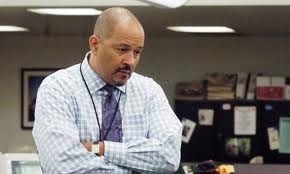The Press in Film & TV
 We asked Dan Bourke of the Daily Mirror to tell thecallsheet.co.uk about the Press on Film & TV.
We asked Dan Bourke of the Daily Mirror to tell thecallsheet.co.uk about the Press on Film & TV.
He reveals the show that got him hooked on journalism and the best and worst portrayals on screen.
Of course, no one in a real newsroom ever says “Stop the press!”
Reporters sometimes, very infrequently, nail the killer fact of an exclusive story just in time to catch the last edition. Certainly, very late decisions are taken on big stories and, quite often, inconveniently famous people die inconveniently after we’ve gone “off-stone”.
But no one ever says ‘Stop the press’. Nor the elegant variation offered by Bill Nighy as insouciant Cameron Foster in State of Play (2003): “It’s a stop.”
If they ever did, it was before my day. What we (the nightdesk) say now, in the era of full-colour presses and computer-to-plate printing, is “Tell the sites I’m slipping One,” which sounds moderately smutty but is not very dramatic.
The question is, do we want films and telly to be more like the real life of a paper? The answer is: hell, no.
The more gun-toting, press-stopping, dame-clinching, brace-wearing screen heroes there are, the better we real-life paunchy, Mac-eyed drones can feel about ourselves.
(If at the same time we can have a bit of a sneer at how ‘real paper’s aren’t like that, don’t you know’, then so much the better.)
It would be prefereable to say one’s love of newspapers, or even one’s love of newspaper screen-heroes, started with the greats.
There are plenty of them; Hollywood loved a hack.
From as early as The Front Page (1931) up to and beyond Sweet Smell of Success (1957) a carnival of hacks, editors, publishers, flashbulb-snappers, newsgals and the rest set up tropes and cliches that are still honoured and reworked today, from Jennifer Jason Leigh’s spunky reportress in the Coen Bros’ The Hudsucker Proxy (1994) to JK Simmons’ Daily Bugle editor in the latest Spiderman franchise (2002-2012).
His Girl Friday (1940) (a remake of The Front Page) stands out. Citizen Kane (1941) is quite a good film too, I can exclusively reveal.
But my love of papers, and paper-heroes, didn’t start with Cary Grant or Orson Welles. It started with Press Gang (1989-93).
Monomaniacal editor Lynda (Julia Sawalha). Her deputy, the dignified, wise consigliere Kenny (Lee Ross), wild-card Dexter Fletcher, profiteer Paul Reynolds. They were the coolest kids on telly, and they did it through the power of news. And I could name you at least two exact equivalent characters working on national papers now.
In film, the genre journalism seems to fit to greatest effect is the conspiracy thriller, the biggest and best of which, and the truest, is All The President’s Men (1976).
I don’t know what’s cooler, the fact that a couple of hacks and a brass-balled editor did pretty much bring down Tricky Dicky, or those shirts worn by Bob Woodward and Carl Bernstein. Or the fact they named the source after the porn film Deep Throat.
And never forget Bernstein’s other gift to cinema: that it wasn’t until her painful divorce from him that Nora Ephron got her groove on and started writing When Harry Met Sally.
ATPM is the apotheosis of hack-as-hero films. The moment Hoffman just stays silent because he thinks the guy on the phone knows something else is just… perfect.
In the same field is the Parallax View (1974), also by Alan J Pakula, with Warren Beatty as a more fictional and infinitely more unlikely hack with a political assassination scoop. There’s also Defence of the Realm (1986), a fine Brit effort with Gabriel Byrne in 80s boozy Fleet Street.
And of course State of Play on TV (2003), with Nighy’s awesome turn as a louche editor (whoever heard of one of those?) and John Simm as a chippy northern reporter (the very idea!)
As a production man, the one error of fact that does hurt is one seen here: where the reporter writes his headline straight into the page (and it doesn’t even fit). A sub editor does that. Recognise.
Although a whole host of movie media men should have honourable mentions – the West Wing’s Danny Concannon, the excellent, Scottish and boozy Field of Blood, Lois Lane, Peter Parker… TinTin! – only one titan remains.
Everyone’s bored of hearing how great The Wire is, right?
 But if one of the defining worries about newspapers is that whenever they report on something you know about, they get it wrong, then it has to be a defining commendation of David Simon’s epic that they wrote about something I know intimately – newspapers, in season five – and they absolutely nailed it.
But if one of the defining worries about newspapers is that whenever they report on something you know about, they get it wrong, then it has to be a defining commendation of David Simon’s epic that they wrote about something I know intimately – newspapers, in season five – and they absolutely nailed it.
Sure, there were cultural differences (the Baltimore Sun had a Moscow bureau?) but the feel of the newsroom is precise. The dead language of lay-off announcements, the office’s affable human dictionary, the barfing of sarcasm at TV politicians – and news editor Gus Haynes’ post-deadline night-panic.
And in an era when it isn’t always great, this great game, old Gus has some inspirational words: “Where else would you rather be, huh kids… There are a million stories in the naked city, but you poor mooks only need to throw me three or four.”
Daniel Bourke is assistant night editor at the Daily Mirror. He previously worked for The Wharf, in Docklands, and Roll Call, in Washington, DC.
thecallsheet.co.uk is a members only service for professionals in Film and TV. Click here for more information about what we do.